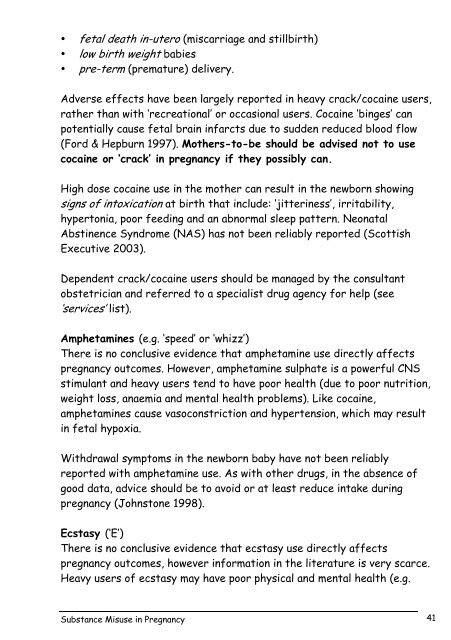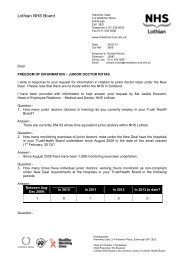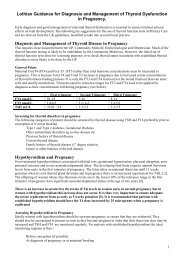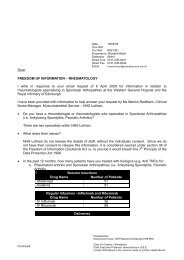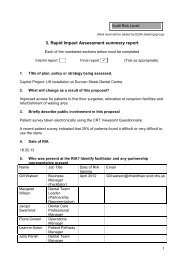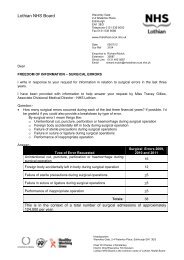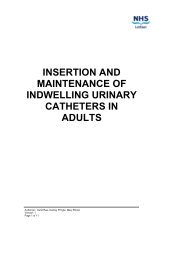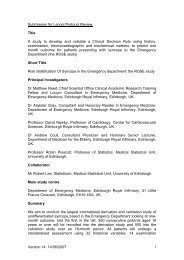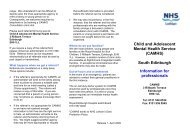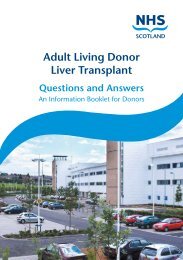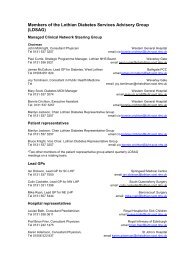Substance Misuse in Pregnancy - NHS Lothian
Substance Misuse in Pregnancy - NHS Lothian
Substance Misuse in Pregnancy - NHS Lothian
Create successful ePaper yourself
Turn your PDF publications into a flip-book with our unique Google optimized e-Paper software.
• fetal death <strong>in</strong>-utero (miscarriage and stillbirth)<br />
• low birth weight babies<br />
• pre-term (premature) delivery.<br />
Adverse effects have been largely reported <strong>in</strong> heavy crack/coca<strong>in</strong>e users,<br />
rather than with ‘recreational’ or occasional users. Coca<strong>in</strong>e ‘b<strong>in</strong>ges’ can<br />
potentially cause fetal bra<strong>in</strong> <strong>in</strong>farcts due to sudden reduced blood flow<br />
(Ford & Hepburn 1997). Mothers-to-be should be advised not to use<br />
coca<strong>in</strong>e or ‘crack’ <strong>in</strong> pregnancy if they possibly can.<br />
High dose coca<strong>in</strong>e use <strong>in</strong> the mother can result <strong>in</strong> the newborn show<strong>in</strong>g<br />
signs of <strong>in</strong>toxication at birth that <strong>in</strong>clude: ‘jitter<strong>in</strong>ess’, irritability,<br />
hypertonia, poor feed<strong>in</strong>g and an abnormal sleep pattern. Neonatal<br />
Abst<strong>in</strong>ence Syndrome (NAS) has not been reliably reported (Scottish<br />
Executive 2003).<br />
Dependent crack/coca<strong>in</strong>e users should be managed by the consultant<br />
obstetrician and referred to a specialist drug agency for help (see<br />
‘services’ list).<br />
Amphetam<strong>in</strong>es (e.g. ‘speed’ or ‘whizz’)<br />
There is no conclusive evidence that amphetam<strong>in</strong>e use directly affects<br />
pregnancy outcomes. However, amphetam<strong>in</strong>e sulphate is a powerful CNS<br />
stimulant and heavy users tend to have poor health (due to poor nutrition,<br />
weight loss, anaemia and mental health problems). Like coca<strong>in</strong>e,<br />
amphetam<strong>in</strong>es cause vasoconstriction and hypertension, which may result<br />
<strong>in</strong> fetal hypoxia.<br />
Withdrawal symptoms <strong>in</strong> the newborn baby have not been reliably<br />
reported with amphetam<strong>in</strong>e use. As with other drugs, <strong>in</strong> the absence of<br />
good data, advice should be to avoid or at least reduce <strong>in</strong>take dur<strong>in</strong>g<br />
pregnancy (Johnstone 1998).<br />
Ecstasy (‘E’)<br />
There is no conclusive evidence that ecstasy use directly affects<br />
pregnancy outcomes, however <strong>in</strong>formation <strong>in</strong> the literature is very scarce.<br />
Heavy users of ecstasy may have poor physical and mental health (e.g.<br />
<strong>Substance</strong> <strong>Misuse</strong> <strong>in</strong> <strong>Pregnancy</strong><br />
41


